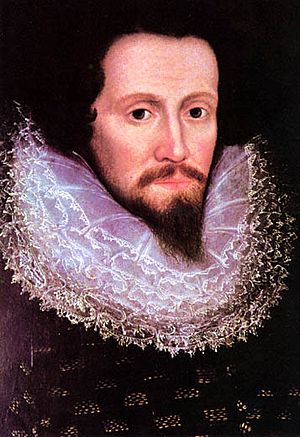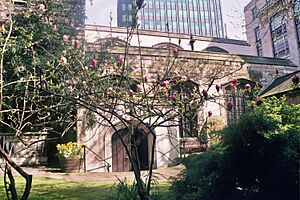Anthony Bacon (1558–1601) facts for kids
Quick facts for kids
Anthony Bacon
|
|
|---|---|

Anthony Bacon in 1594
|
|
| Born | 1558 London, Kingdom of England
|
| Died | 1601 (aged 42–43) |
| Resting place | St Olave Hart Street |
| Education | Trinity College, Cambridge |
| Parent(s) | Sir Nicholas Bacon Anne Cooke |
Anthony Bacon (born 1558, died 1601) was an important member of the famous English Bacon family. He worked as a spy during the time of Queen Elizabeth I. He was also the older brother of the well-known philosopher and statesman, Francis Bacon.
Contents
Anthony Bacon's Early Life (1558–1580)
Anthony Bacon was born in 1558. This was the same year his father, Sir Nicholas Bacon, became the Lord Keeper of the Great Seal. This was a very important job for Queen Elizabeth I. Anthony's mother, Anne, was the daughter of a famous scholar named Anthony Cooke. His aunt was married to William Cecil, 1st Baron Burghley, who was a powerful advisor to the Queen. This made Burghley Anthony's uncle. Anthony's younger brother, Francis Bacon, who became very famous, was born three years later in 1561.
Anthony and Francis grew up in York House in London. Their mother was one of the most educated women of her time. She spoke many languages, including French, Latin, Greek, Spanish, Hebrew, and Italian. She was in charge of their early education. In April 1573, both brothers went to Trinity College, Cambridge. They lived with the head of the college, John Whitgift. Their father passed away in February 1579. He had been one of the most powerful people in England for twenty years.
Years as a Spy in France (1580–1592)
In 1580, Anthony Bacon traveled to France. While there, he worked as an "intelligencer," which means he gathered secret information. He reported to the English spymaster, Sir Francis Walsingham. He first settled in a town called Montauban. He faced some trouble there but was helped by Henry, who later became the King of France.
Anthony was friends with the famous French writer Montaigne. He spent two years in Bordeaux when Montaigne was writing his important book, Essays. In 1590, Bacon helped another English spy, Anthony Standen, who was in prison in Bordeaux. Bacon paid Standen's debts and helped him return to England. Anthony lived in France until 1592. He remained a friend of Henry even after Henry became King Henry IV.
Working with His Brother in England (1592–1594)
Anthony Bacon came back to England in February 1592. He first stayed with his brother Francis at Francis's home in Gray's Inn. Together, they set up an office with many secretaries. These secretaries were writers, translators, and people who worked with secret codes. They handled letters, translations, and even helped with plays and entertainments.
In 1593, Bacon paid for his friend Antonio Pérez to come to England. Pérez might have been the inspiration for a character in Shakespeare's play Love's Labour's Lost. Also in 1593, Bacon was chosen to be a member of Parliament for Wallingford.
Working for the Earl of Essex (1595–1601)
In April 1594, Anthony Bacon moved into his own home in Bishopsgate, London. He became friends with a Scottish diplomat named David Foulis. Bacon hoped this friendship would help him gain favor with James VI of Scotland, who would later become King of England.

The next year, Bacon became a secretary for Robert Devereux, 2nd Earl of Essex. He moved into Essex House, which was the Earl's home. At this time, Essex House was a center for writers and thinkers. Many important people, including the Earl of Essex himself, were part of this group.
In 1595, the Chancellor of Scotland, John Maitland, tried to set up a secret communication with the Earl of Essex. Essex replied that he only wrote with the Queen's knowledge. Bacon met another Scottish messenger, William Keith of Delny, who offered his help to Queen Elizabeth against Spain. Bacon wrote to John Bothwell, saying that their talks needed to be kept secret.
Anne of Denmark, who was the Queen of Scotland, asked for portraits of the Earl of Essex and Lady Rich. In 1596, Queen Elizabeth sent a tiny portrait of herself by Nicholas Hilliard to Prince Henry of Scotland. This gift was received by the Earl of Mar at Stirling Castle.
A Scottish diplomat named Archibald Douglas said that King James VI gave Bacon a valuable ring. Bacon later tried to sell the ring, but the jeweler said it was worth less than what was claimed.
In 1597, Bacon was a Member of Parliament for Oxford.
In 1601, the Earl of Essex was accused of a serious crime against the country. Anthony's brother, Francis Bacon, played a part in the legal process against Essex. Anthony Bacon passed away shortly after this, at the home of Essex's widow, Frances Walsingham. He is buried at St Olave Hart Street.
Anthony Bacon's Legacy
After Anthony's death, his brother Francis collected all of Anthony's letters and writings. Francis left these papers to his literary helper, William Rawley. Rawley then passed them on to Thomas Tenison, who finally gave them to the Lambeth Palace library. These important papers are still kept there today.
In 1975, a book called Golden Lads by Daphne du Maurier found old records about Anthony Bacon in Montauban, France. Before this, there were no English records about his time there.
 | James B. Knighten |
 | Azellia White |
 | Willa Brown |

